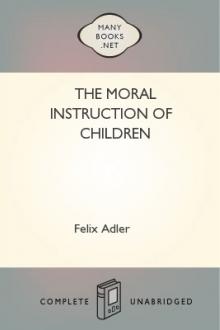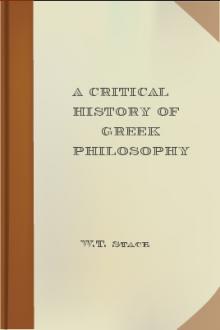Hegel's Philosophy of Mind by Georg Wilhelm Friedrich Hegel (novels to improve english .TXT) 📕

- Author: Georg Wilhelm Friedrich Hegel
- Performer: -
Book online «Hegel's Philosophy of Mind by Georg Wilhelm Friedrich Hegel (novels to improve english .TXT) 📕». Author Georg Wilhelm Friedrich Hegel
§ 381. From our point of view Mind has for its presupposition Nature, of which it is the truth, and for that reason its absolute prius. In this its truth Nature is vanished, and mind has resulted as the “Idea” entered on possession of itself. Here the subject and object of the Idea are one—either is the intelligent unity, the notion. This identity is absolute negativity—for whereas in Nature the intelligent unity has its objectivity perfect but externalised, this self-externalisation has been nullified and the unity in that way been made one and the same with itself. Thus at the same time it is this identity only so far as it is a return out of nature.
§ 382. For this reason the essential, but formally essential, feature of mind is Liberty: i.e. it is the notion's absolute negativity or self-identity. Considered as this formal aspect, it may withdraw itself from everything external and from its own externality, its very existence; it can thus submit to infinite pain, the negation of its individual immediacy: in other words, it can keep itself affirmative in this negativity and possess its own identity. All this is possible so long as it is considered in its abstract self-contained universality.
§ 383. This universality is also its determinate sphere [pg 007] of being. Having a being of its own, the universal is self-particularising, whilst it still remains self-identical. Hence the special mode of mental being is “manifestation.” The spirit is not some one mode or meaning which finds utterance or externality only in a form distinct from itself: it does not manifest or reveal something, but its very mode and meaning is this revelation. And thus in its mere possibility Mind is at the same moment an infinite, “absolute,” actuality.
§ 384. Revelation, taken to mean the revelation of the abstract Idea, is an unmediated transition to Nature which comes to be. As Mind is free, its manifestation is to set forth Nature as its world; but because it is reflection, it, in thus setting forth its world, at the same time presupposes the world as a nature independently existing. In the intellectual sphere to reveal is thus to create a world as its being—a being in which the mind procures the affirmation and truth of its freedom.
The Absolute is Mind (Spirit)—this is the supreme definition of the Absolute. To find this definition and to grasp its meaning and burthen was, we may say, the ultimate purpose of all education and all philosophy: it was the point to which turned the impulse of all religion and science: and it is this impulse that must explain the history of the world. The word “Mind” (Spirit)—and some glimpse of its meaning—was found at an early period: and the spirituality of God is the lesson of Christianity. It remains for philosophy in its own element of intelligible unity to get hold of what was thus given as a mental image, and what implicitly is the ultimate reality: and that problem is not genuinely, and by rational methods, solved so long as liberty and intelligible unity is not the theme and the soul of philosophy.
[pg 008]§ 385. The development of Mind (Spirit) is in three stages:—
(1) In the form of self-relation: within it it has the ideal totality of the Idea—i.e. it has before it all that its notion contains: its being is to be self-contained and free. This is Mind Subjective.
(2) In the form of reality: realised, i.e. in a world produced and to be produced by it: in this world freedom presents itself under the shape of necessity. This is Mind Objective.
(3) In that unity of mind as objectivity and, of mind as ideality and concept, which essentially and actually is and for ever produces itself, mind in its absolute truth. This is Mind Absolute.
§ 386. The two first parts of the doctrine of Mind embrace the finite mind. Mind is the infinite Idea; thus finitude here means the disproportion between the concept and the reality—but with the qualification that it is a shadow cast by the mind's own light—a show or illusion which the mind implicitly imposes as a barrier to itself, in order, by its removal, actually to realise and become conscious of freedom as its very being, i.e. to be fully manifested. The several steps of this activity, on each of which, with their semblance of being, it is the function of the finite mind to linger, and through which it has to pass, are steps in its liberation. In the full truth of that liberation is given the identification of the three stages—finding a world presupposed before us, generating a world as our own creation, and gaining freedom from it and in it. To the infinite form of this truth the show purifies itself till it becomes a consciousness of it.
A rigid application of the category of finitude by [pg 009] the abstract logician is chiefly seen in dealing with Mind and reason: it is held not a mere matter of strict logic, but treated also as a moral and religious concern, to adhere to the point of view of finitude, and the wish to go further is reckoned a mark of audacity, if not of insanity, of thought. Whereas in fact such a modesty of thought, as treats the finite as something altogether fixed and absolute, is the worst of virtues; and to stick to a post which has no sound ground in itself is the most unsound sort of theory. The category of finitude was at a much earlier period elucidated and explained at its place in the Logic: an elucidation which, as in logic for the more specific though still simple thought-forms of finitude, so in the rest of philosophy for the concrete forms, has merely to show that the finite is not, i.e. is not the truth, but merely a transition and an emergence to something higher. This finitude of the spheres so far examined is the dialectic that makes a thing have its cessation by another and in another: but Spirit, the intelligent unity and the implicit Eternal, is itself just the consummation of that internal act by which nullity is nullified and vanity is made vain. And so, the modesty alluded to is a retention of this vanity—the finite—in opposition to the true: it is itself therefore vanity. In the course of the mind's development we shall see this vanity appear as wickedness at that turning-point at which mind has reached its extreme immersion in its subjectivity and its most central contradiction.
[pg 010]§ 387. Mind, on the ideal stage of its development, is mind as cognitive: Cognition, however, being taken here not as a merely logical category of the Idea (§ 223), but in the sense appropriate to the concrete mind.
Subjective mind is:—
(A) Immediate or implicit: a soul—the Spirit in Nature—the object treated by Anthropology.
(B) Mediate or explicit: still as identical reflection into itself and into other things: mind in correlation or particularisation: consciousness—the object treated by the Phenomenology of Mind.
(C) Mind defining itself in itself, as an independent subject—the object treated by Psychology.
In the Soul is the awaking of Consciousness: Consciousness sets itself up as Reason, awaking at one bound to the sense of its rationality: and this Reason by its activity emancipates itself to objectivity and the consciousness of its intelligent unity.
For an intelligible unity or principle of comprehension each modification it presents is an advance of development: and so in mind every character under which it appears is a stage in a process of specification and development, a step forward towards its goal, in order [pg 011] to make itself into, and to realise in itself, what it implicitly is. Each step, again, is itself such a process, and its product is that what the mind was implicitly at the beginning (and so for the observer) it is for itself—for the special form, viz. which the mind has in that step. The ordinary method of psychology is to narrate what the mind or soul is, what happens to it, what it does. The soul is presupposed as a ready-made agent, which displays such features as its acts and utterances, from which we can learn what it is, what sort of faculties and powers it possesses—all without being aware that the act and utterance of what the soul is really invests it with that character in our conception and makes it reach a higher stage of being than it explicitly had before.
We must, however, distinguish and keep apart from the progress here studied what we call education and instruction. The sphere of education is the individual's only: and its aim is to bring the universal mind to exist in them. But in the philosophic theory of mind, mind is studied as self-instruction and





Comments (0)